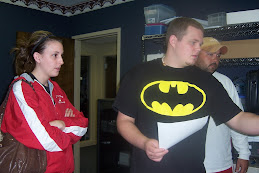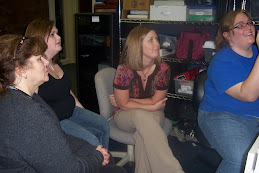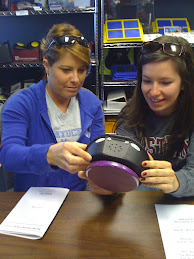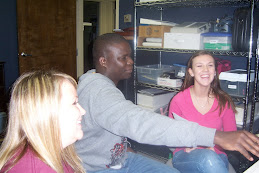If I asked you to identify all of the food groups listed below how would you accurately answer?
1. bananas
2. dairy
3. fruits
4. French fries
5. Egg
6. Fats & Oils
7. hamburger
Now on the test question that is asking you to identify the grammatical morphemes. . . what type of answers will be accurate for that question? Feel free to identify the type and even list those words (not the answers for the test) here. I have passed out that list in class. The list is in the book and is on Blackboard.
If banana is NOT the correct answer above, think about what words can NOT be the correct answer for your test. I encourage you to share this information with your classmates if they do not regularly read the blog.
3/20/09
Subscribe to:
Post Comments (Atom)






I understand that you're looking for the specific grammatical morpheme (plurals, past irregular verb, present progressive verb ending, etc.) but I'm still a little confused. Does every word in the sentence have a grammatical morpheme? I've been looking at the list and can't seem to find what some of the words are so that leads me to think that there are some that don't have grammatical morphemes. But then, that is confusing to me because I think all words should be explained by something like that. Please clear this up for me, thanks.
ReplyDeleteOk, I have another question so I thought I would just post it here with my last one! For number 7, do we need to count the utterances and morphemes as well as identifying the intransitive, transitive, and equative sentences? I know it's not a part of the question, but I also thought that analyzing a language sample would include those. Just wondering. Thanks.
ReplyDeleteEvery word does NOT have a GRAMMATICAL morpheme. It may be counted as a morpheme but does not have a GRAMMATICAL morpheme associated with it.
ReplyDeleteSo, the word "sit" for example has not been altered or changed for a grammatical reason (tense of the verb, more than one, etc.). The word bird is not itself a grammatical morpheme or does not contain any grammatical morphemes. It is itself counted as ONE morpheme when counting total morphemes.
I will to identify ALL of the grammatical morphemes in the following sentence:
I am writing words.
Grammatical morphemes present:
present progressive verb - writing
plurals - words
Question #7
ReplyDeleteYou are right. It says nothing about counting utterances and morphemes. Don't do it.
The purpose of the question is not to have you complete language analyisis.
I am using the verb ANALYZE to be specific and to use vocabulary of how I want you to THINK. If you are appropriately approaching this question you are going to analyze, take apart and look closely at the parts of the child's spoken language. You will then based on your knowledge and understanding of grammar determine the structure of each part. You are simply analyzing each utterance of the child.
(Not just see, look at, review...I want you to analyze - THINK about...)
This clears everything up! Thank you. :)
ReplyDeleteThat also helped me out too! Thanks Mrs. White
ReplyDeleteYea that makes the question much easier to understand. Thanks Mrs. White.
ReplyDeleteGlad I could answer a question other than someone's PHONE NUMBER!!! :) She'll NEVER live this one down!
ReplyDeleteNow . . . we need to apply this to the original instruction. I DO think I did teach it this way because this type of question was on the test last semester and students struggled with it.
Therefore...how many times do we need to be exposed to NEW information in how many different ways (for what purpose - test question and points - or personal relevance) is necessary before we INTERNALIZE and understand it?
I am so glad that Mrs. White started this post. I had trouble with this question as well. I understand the idea of grammatical morphemes and I know what they are. I just struggle with HOW exactly to answer the question. This post really helped me and cleared everything up!! Thanks!! =]
ReplyDeleteThank you for the further explanation of those 2 questions, it was very helpful! My only trouble was figuring out what an equative sentence is exactly, because equative is not even recognized as a word in Microsoft Word.
ReplyDeleteThanks for the posts above it really helped me to understand whether I had answered the question correctly or incorrectly. I think as college students we tend to try to get things done in a fast manner and we sometimes just do not read what is exactly on the paper. Just as you proof read your writing you totally sometimes read a sentence that is wrong but you say it right so you totally skip over it and do not see it as wrong. I think that during test we get so stressed that we tend to read so fast and try to answer it that we do not concentrate on the actually meaning of the question and what it is really asking. This class has really helped and allowed me to do that. It has also shown me how to correctly answer questions that ask to explain, identify, and describe etc. Thanks so much for being helpful and taking the time to answer our question that may at times sound outlandish. =)
ReplyDelete